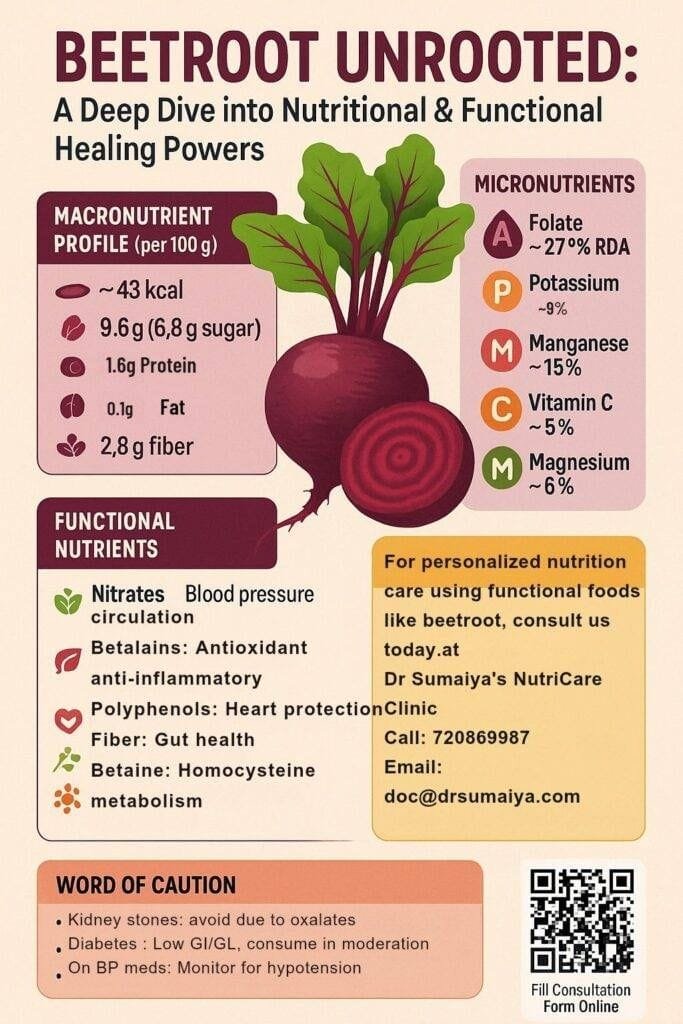Beetroot: A Functional Powerhouse Rooted in Nutritional Riches
Beetroot (Beta vulgaris), commonly known as garden beet or red beet, has long been celebrated not only for its vibrant hue and earthy flavor but also for its impressive therapeutic value. From a functional medicine perspective, beetroot acts as a nutritional pharmacopeia, providing support for detoxification, vascular health, cognitive function, and inflammation modulation. Let us explore its profile starting from macronutrients down to its unique phytonutrients and therapeutic compounds.
I. Macronutrient Composition (per 100g raw beetroot)
Key Insight:
While beetroot is low in fat and protein, its naturally occurring sugars are offset by high fiber content, leading to a moderate glycaemic response. Its water content also supports hydration and satiety.
II. Micronutrient Profile
Vitamins:
Minerals:
Key Insight:
Beetroot is particularly rich in folate, essential for methylation pathways and red blood cell production, and manganese, involved in antioxidant defense and bone metabolism. Its potassium content contributes to vascular tone and blood pressure regulation.
III. Functional Nutrients and Therapeutic Compounds
1. Nitrates (NO3-)
Beetroot is one of the richest dietary sources of inorganic nitrates. These are converted via the nitrate-nitrite-nitric oxide pathway into nitric oxide (NO)—a potent vasodilator.
Functional Benefits:
- Lowers blood pressure (especially systolic)
- Improves endothelial function
- Enhances exercise performance and endurance
- Improves cognitive blood flow in older adults
2. Betalains (Betacyanins and Betaxanthins)
These are the pigments responsible for beetroot’s red-violet colour, acting as powerful antioxidants and anti-inflammatory agents.
Functional Benefits:
- Scavenges free radicals
- Reduces markers of oxidative stress (e.g., MDA, 8-isoprostane)
- Modulates COX-2 expression and inflammatory cytokines
3. Polyphenols and Flavonoids
Beetroot contains several polyphenolic compounds including ferulic acid, caffeic acid, rutin, and kaempferol, which contribute to its anti-inflammatory and hepatoprotective effects.
4. Dietary Fiber (Soluble and Insoluble)
Aids in:
- Supporting gut microbiota
- Improving stool bulk and motility
- Reducing cholesterol reabsorption
5. Glycine Betaine
A methyl donor involved in homocysteine metabolism, supporting cardiovascular health and methylation pathways.

IV. Clinical Applications in Functional Medicine
1. Cardiovascular Health
- Blood Pressure Control: Rich in dietary nitrates, beetroot supplementation can reduce systolic blood pressure by ~4–10 mmHg.
- Anti-atherogenic: Folate and betaine lower homocysteine levels.
2. Liver Detoxification
- Betalains and polyphenols support Phase II liver detox pathways (e.g., glutathione conjugation).
- Beetroot enhances bile flow and may prevent hepatic steatosis.
3. Cognitive Function
- Nitrates improve neurovascular coupling, enhancing oxygenation to the prefrontal cortex in aging adults.
- Promising adjunct in mild cognitive impairment (MCI) protocols.
4. Athletic Performance
- Pre-exercise beetroot juice (500 mL or equivalent nitrate content) improves VO2 max, oxygen efficiency, and time-to-exhaustion.
5. Anti-inflammatory and Antioxidant Effects
- Useful in chronic inflammatory diseases (e.g., metabolic syndrome, osteoarthritis).
- Reduces oxidative stress markers in both athletes and sedentary individuals.
V. Usage Guidelines and Considerations
- Forms: Raw (grated), cooked (boiled/steamed), juice, fermented (kanji), powder or extract capsules.
- Dosage: For therapeutic effects (e.g., blood pressure or performance), typically 300–500 mg nitrate/day via ~250–500 mL beetroot juice.
- Contraindications: Caution in individuals with oxalate kidney stones.
- Drug Interactions: Potentiation with antihypertensive medications.
VI. Culinary and Clinical Integration
- Include in functional smoothie formulations, with ginger and lemon for added synergy.
- Prepare fermented beetroot kanji, combining probiotic benefits with beetroot’s liver-supportive action.
- Integrate into detox meal plans, particularly during seasonal transitions or post-fasting support.
- Beetroot juice can be timed pre-exercise or pre-surgery for nitric oxide support.
Conclusion
Beetroot is a prime example of a food that aligns with the functional medicine tenet: “Let food be thy medicine.” Its synergy of nutrients and bioactives supports multiple systems—from cardiovascular and cognitive to hepatic and metabolic. Whether used in preventive protocols or adjunctive care, beetroot remains a valuable, evidence-based ally in holistic health.
For personalized nutrition guidance or integrative detox plans involving beetroot and other functional foods, you may contact:
Dr Sumaiya NutriCare Clinic
Phone: 7208660987
Email: doc@drsumaiya.com
Address: 7, Moore Rd, off Coles Road, Pulikeshi Nagar, Frazer Town, Bengaluru, Karnataka 560005


